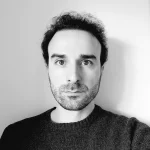Thursday, May 25 • – 9
This conference aims to determine the status of the motif of “death” in Deleuze’s philosophical production, based on the following hypothesis: Deleuze is interested not exactly in death, but in dying; not in life’s end, but in the interminable event that arrives without ever finishing to arrive.
The argument unfolds in two stages. First, we will establish the philosophical background of Deleuze’s work on this question, specifically Maurice Blanchot’s conception of impersonal death as a reversal of the possible into the impossible, of the “I die” into the “They die”—they do not cease, and they do not finish dying.
Secondly, by analyzing Samuel Beckett’s Film through Deleuze’s lens, we will observe that this impossibility marks the movement that cinema represents—the endless exhaustion, the involution, of the onto-theo-logical place of the self, its in-terminable death, its endless dying.
In this sense, we will see that Lazarus becomes the character of cinema; not the Lazarus from the Gospels—character of a miraculous story, a recovering from death—but the other Lazarus, Blanchot’s Lazarus, “whose very death was resurrected.”
Diogo Nóbrega is a PhD candidate in Artistic Studies – Art and Mediations at NOVA University of Lisbon. Between 2018 and 2021, he held a Visiting Student position at Scuola Normale Superiore in Pisa. His publications have appeared in numerous books and peer-reviewed journals.
